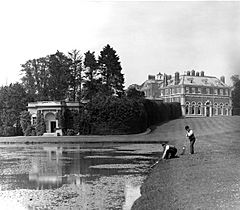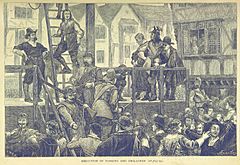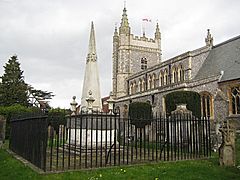Edmund Waller facts for kids
Quick facts for kids
Edmund Waller
|
|
|---|---|
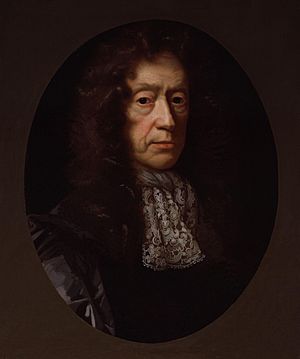
Portrait Waller, by John Riley, circa 1685
|
|
| Member of Parliament for Saltash |
|
| In office May 1685 – November 1685 (suspended) |
|
| Member of Parliament for Hastings |
|
| In office 1661–1679 |
|
| Member of Parliament for St Ives |
|
| In office December 1640 – July 1643 (expelled) |
|
| Member of Parliament for Amersham |
|
| In office April 1640 – May 1640 |
|
| Member of Parliament for Wycombe |
|
| In office December 1625 – June 1626 |
|
| Member of Parliament for Ilchester |
|
| In office February 1624 – March 1625 |
|
| Personal details | |
| Born | 3 March 1606 Coleshill, Buckinghamshire, England |
| Died | 21 October 1687 (aged 81) St James's, London, England |
| Cause of death | Edema |
| Resting place | St Mary and All Saints Church, Beaconsfield |
| Education | RGS Wycombe, Eton |
| Alma mater | King's College, Cambridge |
| Occupation | Poet and Politician |
Edmund Waller (born March 3, 1606 – died October 21, 1687) was an English poet and politician. He was a Member of Parliament (MP) for many years, serving in different areas between 1624 and 1687. He was one of the longest-serving members of the English House of Commons.
Waller came from a rich family in Buckinghamshire. He first joined Parliament in 1624. He didn't play a big role in politics until the First English Civil War started in 1642. Unlike some of his relatives, he supported King Charles I. In 1643, he was accused of being part of a plan to help the King's army take control of London. He was spared the death penalty, but some others involved were executed, including his brother-in-law.
After being banished from England, he lived comfortably in France and Switzerland. He was allowed to return home in 1651 by Oliver Cromwell, who was a distant relative. He returned to Parliament after King Charles II came back to the throne in 1660. Waller was known as a great and entertaining speaker. He held several smaller government jobs. He mostly stopped being active in politics after his second wife died in 1677. He passed away in October 1687.
Today, Waller is best known for his poem "Song (Go, lovely rose)". His earliest poems were written in the late 1630s. They often celebrated events from the 1620s, like King Charles's escape from a shipwreck. His poems used a style called heroic couplets, which became very popular for English poets for about 200 years. Famous poets like John Dryden admired his work. He was also a close friend of important thinkers like Thomas Hobbes.
When he died, people thought Waller was a very important English poet. However, his fame faded over time. Now, he is seen as a less important writer. But he is still remembered for helping to develop a poetic style that later poets, like Alexander Pope, used and improved.
Contents
Edmund Waller's Early Life and Family
Edmund Waller was born on March 3, 1606, in Coleshill, Buckinghamshire. He was the oldest son of Robert Waller and Anne Hampden. He came from a large family with many brothers and sisters.
Waller was related to some important Parliamentarian figures. Through his mother, he was distantly related to Oliver Cromwell. He was also related to John Hampden. On his father's side, he was related to the Parliamentarian generals Sir Hardress and Sir William Waller.
In 1631, he married Anne Banks, who was a wealthy orphan. Their marriage was approved by King Charles I. Anne died in 1634 while giving birth. She left behind two children, Robert and Elizabeth.
In 1644, he married again to Mary Bracey. They had many children together. Their oldest son, Benjamin, had a disability. So, his younger brother Edmund became the heir. This Edmund also became an MP for Amersham. His youngest son, Stephen, helped negotiate the 1707 Treaty of Union between England and Scotland. When Edmund Waller died, he left a large amount of money.
Edmund Waller's Education and Career
Waller went to Royal Grammar School, High Wycombe, then Eton, and King's College, Cambridge. He left university without a degree. Like many young men at the time, he studied law at Lincoln's Inn and finished in 1622.
He was first elected as an MP in 1624 for Ilchester. He was the youngest person in the English House of Commons at that time. Later, he was elected for Chepping Wycombe in 1626. When he turned 21 in 1627, he inherited a very valuable estate. This made him one of the richest men in Buckinghamshire.
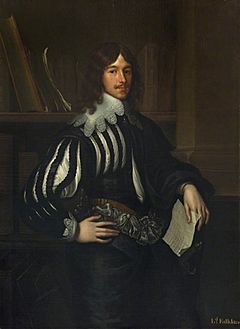
Waller was elected again for Amersham in 1628. He didn't do much in Parliament before King Charles I decided to rule without Parliament for eleven years. During this time, Waller became friends with George Morley, who helped him with his reading and writing. Morley also introduced Waller to Lucius Cary, 2nd Viscount Falkland. Waller joined a group of thinkers called the Great Tew Circle. He was greatly influenced by Falkland's calm and accepting views.
Many of Waller's early poems were written to gain favor at the King's court. He wrote about King Charles and members of the powerful Percy family. A friend noted that Waller started writing poetry when he was about thirty.
When King Charles called Parliament back in April 1640, Waller was re-elected for Amersham. Then he was elected for St Ives in November. Many people felt the King had gone too far by ruling without Parliament. But some, like Waller's friends, didn't want to change things too much either. Waller was asked to help with a case against a judge, but he showed his support for the King by voting against the execution of a key royal advisor and against removing bishops from the House of Lords.
Unlike some friends who joined the King when the First English Civil War began in August 1642, Waller stayed in London. He continued to support those who wanted to find a peaceful solution. In May 1643, a plan was discovered. It was said that Waller, his brother-in-law, and a merchant were involved. The plan seemed to start as a way to make Parliament negotiate by not paying taxes. But it grew into a plan to help the King's army take control of London.
After Waller was arrested, he told everything he knew, which involved others. He was spared the death penalty, but others were executed in July 1643. Many people who wanted peace were forced to change their minds and support military action to avoid suspicion. After being in prison for 18 months, Waller was fined a large sum of money. He was allowed to go into exile in November 1644 with his new wife. However, this event damaged his reputation for a long time.
Waller traveled in Switzerland and Italy. Unlike many who supported the King, he lived comfortably because his mother sent him money. With help from his relatives, he was allowed to return home in January 1652. He became friends with Oliver Cromwell and wrote a poem praising him in 1655. He even supported ideas to make Cromwell king.
When King Charles II returned to the throne in 1660, Waller wrote a poem to celebrate. In 1661, he was elected as an MP for Hastings. He became a Fellow of the Royal Society in 1663. He played a big part in the removal of a powerful minister named Clarendon in 1667. After that, he held several positions under the King's government.
At first, people thought Waller always supported the King's court. But after 1674, he became known for being independent. He was still seen as one of the best speakers in the Commons. He generally supported religious tolerance, especially for Protestant groups who were not part of the main church. However, he believed in a supposed plot against the King in 1678. He then stepped back from politics between 1679 and 1681. When James II became king, Waller was elected for Saltash in 1685.
He wrote two poems to the new king, asking for peace and unity. But King James stopped Parliament from meeting in November when they refused to pass a new law. Waller died at his London home on October 21, 1687. He was buried in the churchyard of St Mary and All Saints Church in Beaconsfield. His tomb is now a protected historical site.
Edmund Waller's Literary Works and Impact
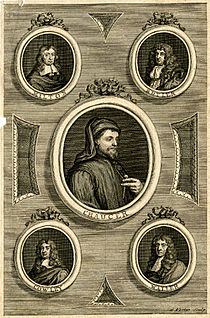
Other writers of his time, like John Dryden, admired Waller. One writer called him "the Parent of English Verse." However, by the 1800s, his work was not as popular. A biographer wrote that Waller's poems were once admired too much. He felt that, except for "Go, lovely Rose" and a few others, they had lost their appeal.
By 1995, a character in a novel even called him a "mediocrity." However, some scholars argue that harsh judgments about his life have made people overlook his true importance. They suggest that while his writing might be limited, he was important for developing a style that later poets, like Alexander Pope, improved upon.
Much of his early poetry was written for the royal court. He was famous for his "Panegyricks," which were poems praising important people. He wrote them for Cromwell, and later for King Charles II and his brother James. His longest poem of this type described a battle at sea in 1665. He presented it as a great victory and praised James, even though the battle was not a clear win. This poem was often made fun of.
Waller was greatly influenced by the philosopher Thomas Hobbes. He admired Hobbes's book Leviathan. During his time in exile, a collection of his poems was published without his permission in 1645. This collection was reprinted many times and was popular partly because the poems could easily be set to music. Two more books of his writings were published after his death in 1690. These included his Divine Poems, which he published himself in 1686. Most critics think these later poems were not as good and showed his writing was declining.
See also
 In Spanish: Edmund Waller para niños
In Spanish: Edmund Waller para niños
 | James Van Der Zee |
 | Alma Thomas |
 | Ellis Wilson |
 | Margaret Taylor-Burroughs |


